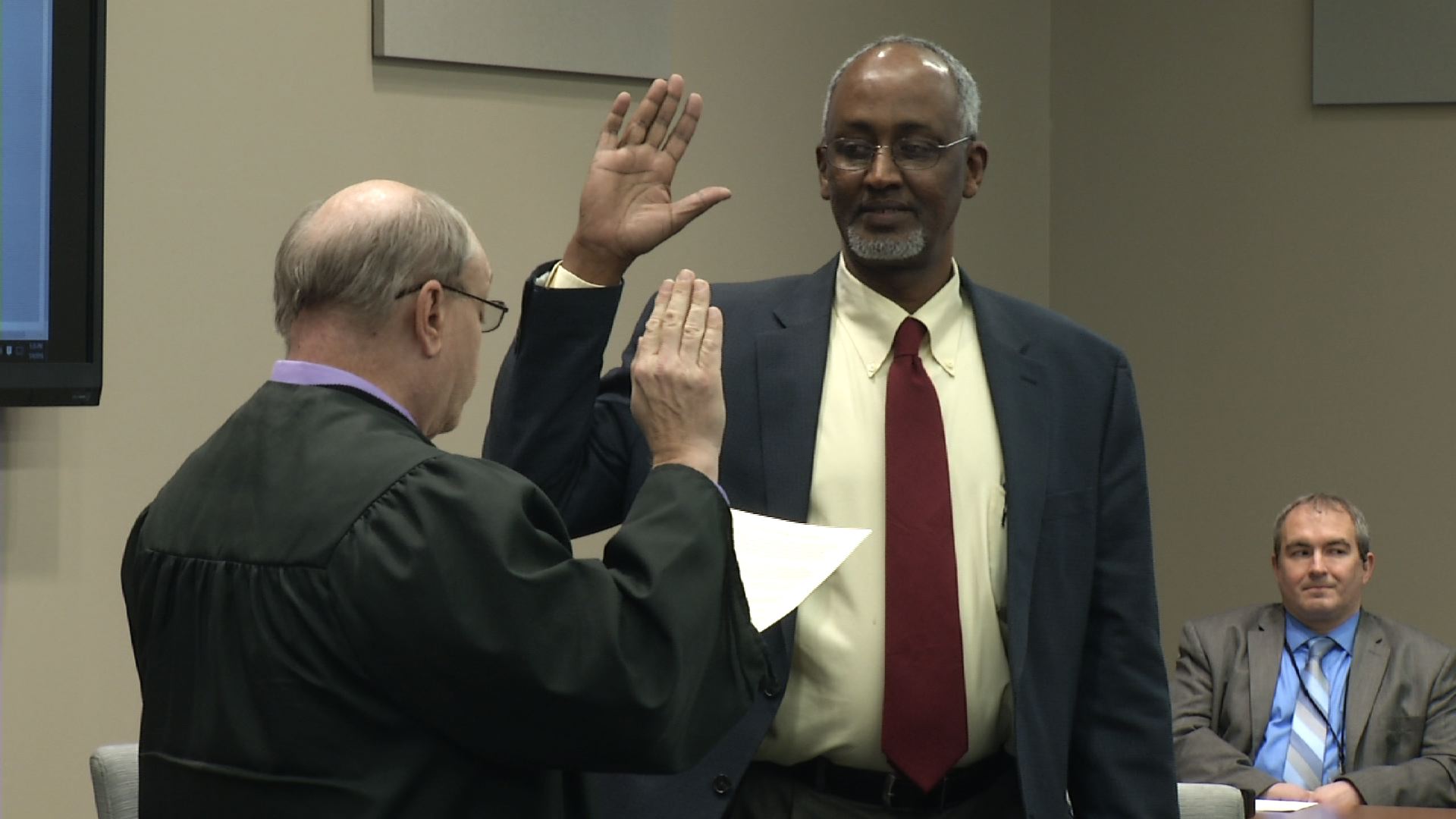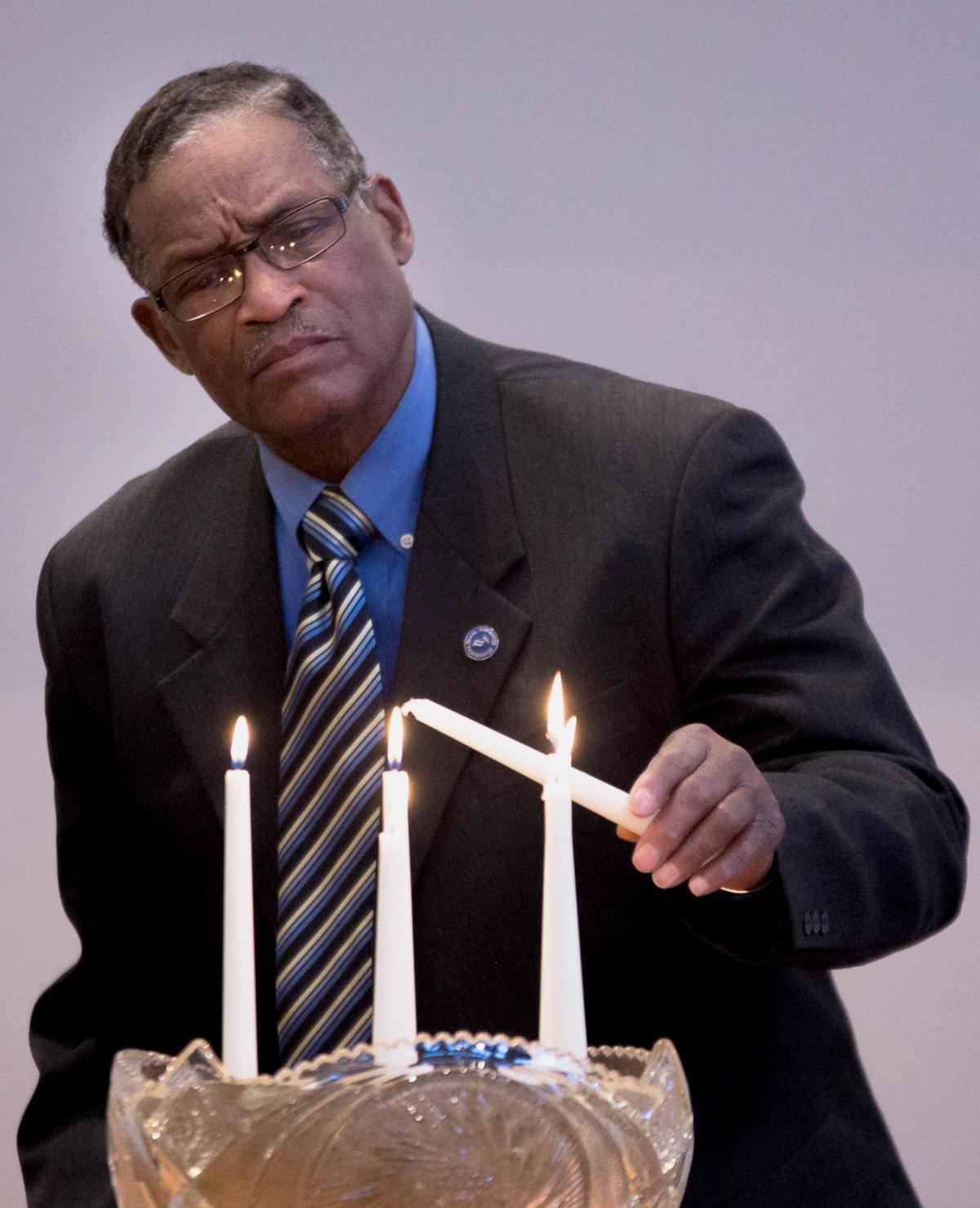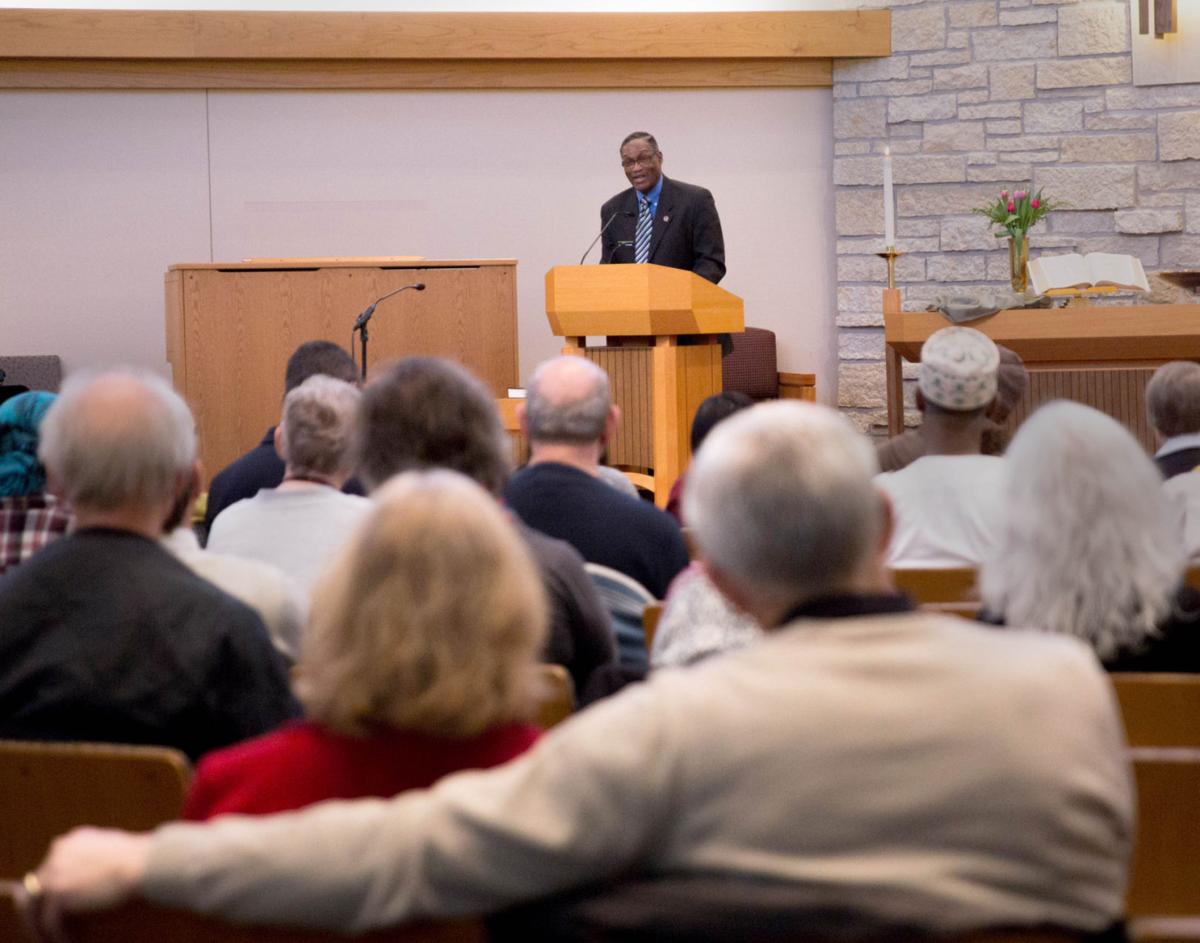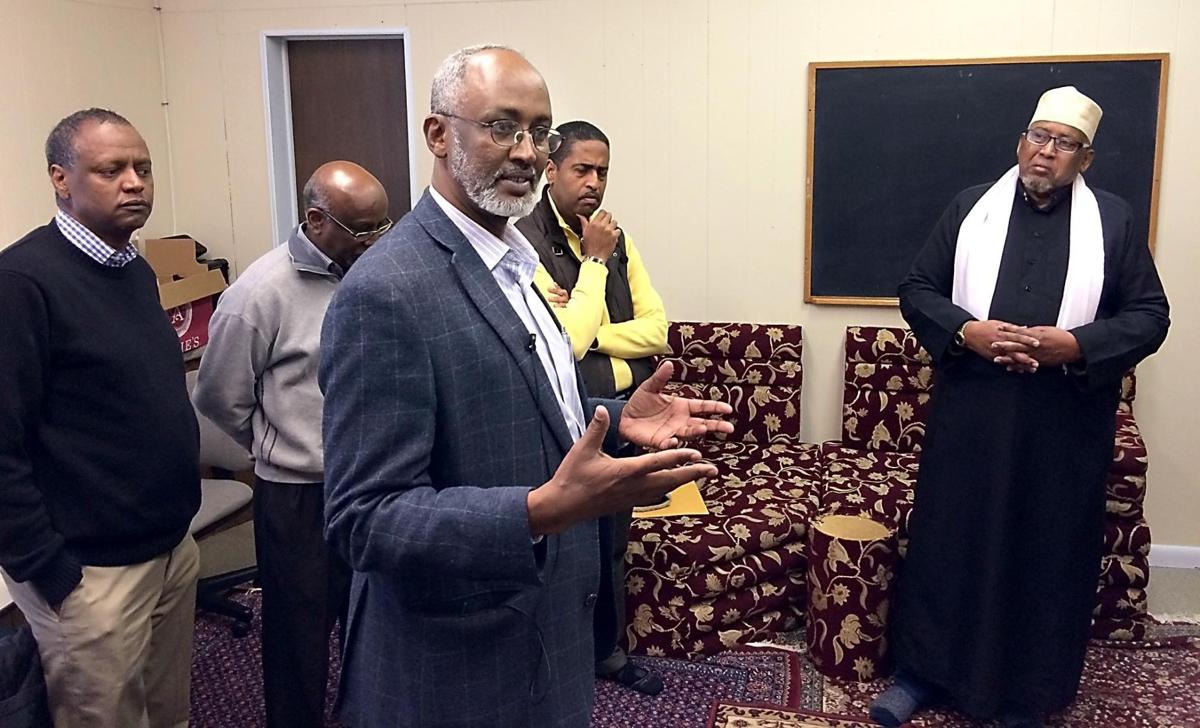Abdi is running for Mankato (ISD 77) School Board. His community involvements include membership on the Region Nine Development Commission, Mankato Public Safety Advisory Board, Blue Earth County Child Protection Advisory Board, and Habitat for Humanity Family Selection Committee. He has been instrumental in improving English as a 2nd language educational programs in the Mankato school district, is a leader of the Mankato Somali community and a trusted friend to many in greater Mankato.
Monday, March 6, 2017
Community comes together to celebrate MLK
Michael Fagin, a retired Minnesota State University professor, lights the candles of reflections before speaking Sunday at the First Congregational United Church of Christ in Mankato. Photo by Trevor Cokley
Michael Fagin, a retired Minnesota State University professor, speaks in front of a diverse congregation about Martin Luther King Jr. and the movement for equality Sunday at the First Congregational United Church of Christ in Mankato. Photo by Trevor Cokley
For all the progress we've achieved in assuring civil rights for all, there is still work to be done.
That was one of the themes behind an area interfaith celebration of Martin Luther King Jr. on Sunday at First Congregational United Church of Christ, a day before the famous Civil Rights Movement leader's national holiday.
More than 100 people attended the event, organized by seven area churches — Bethlehem Lutheran Church, Unitarian Universalist Fellowship of Mankato, First Presbyterian Church, Centenary United Methodist Church, First Congregational United Church of Christ, Grace Lutheran Church, and the School Sisters of Notre Dame — and the Mankato Islamic Center.
"To be a part of this interfaith celebration is warming to my heart," said Michael Fagin, a retired professor at Minnesota State University. "And I hope that it will be warming to all of you."
Fagin was one of several speakers who reflected on King's words, as well as the struggle for racial and religious equality in the U.S. over the past few decades.
The former professor marched in several protests during the 1960s and 1970s, including in a protest in New Orleans where King and other civil rights leaders also participated. He thought his protest days were behind him until the late 1980s, when someone put a burning cross on a Kasota, Minnesota family's lawn because they were an interracial couple.
Fagin marched with his daughter and a group of people from St. Peter, Minnesota, to Kasota, "demonstrating to that community that there was support for equality, justice and freedom, and to rid ourselves of the evils of those that felt it was the right thing to do to burn the cross."
Not every black person shares the same sort of experiences that Fagin did, however. Mankato Area Public Schools Board Member Abdi Sabrie may have been born in another country, but the U.S. immigrant-turned-citizen has dealt with his share of latent racism as well.
Sabrie recalled how he tried to buy fruit from a market in a white neighborhood in Atlanta, Georgia, in 1984 only to be turned away.
"They told me they wouldn't sell to me because I was black," he said.
He also recalled the time a restaurant owner told a police officer in Washington, D.C. to remove a homeless white person, only to find the officer tried to remove Sabrie instead.
Sabrie has become an advocate for immigrants and refugees over the years, something he said was made possible because of the Civil Rights Movement.
"I wouldn't be here without the struggle and work of civil rights leaders like Dr. Martin Luther King," he said.
Today, advocates for various civil rights causes are struggling with similar issues. The Black Lives Matter movement emerged over the past few years in response to perceived issues between police and black residents in various communities, as well as several fatal shootings of black people committed by white officers.
Demonstrations and marches have taken place all across the country, including in Minneapolis in November after police shot and killed 24-year-old Jamar Clark during a domestic violence call.
Renita Robinson, the executive director of the Community Against Domestic Abuse, shared her experience speaking with her youngest son, who had been pulled over by police several months ago.
Robinson's son told her he had a taillight out, was speeding, and probably had one too many to drink the night he was pulled over.
Her son said he feared for his life once the officer raised his voice, shouted at him to stop escalating the situation and called for backup. Several officers arrived but wouldn't come closer for fear of making things worse.
Robinson said her son had to force himself to calm down after a tense situation, lest he find himself shot by police.
"'I remember all the things that we talked about, and all of the things that have been going on in the news,' he said, ' and I realized it was true.'" Robinson told the audience.
Despite the issues, many people are trying to follow in King's and other leaders' footsteps.
Jaylani Hussein became the executive director of the Minnesota chapter of the Council on American-Islamic Relations in 2015, during a year where presidential candidate Donald Trump called for a ban on all Muslims entering the U.S., among other issues.
"My first year just came to a conclusion, and I must say, uff-da," Hussein said.
Yet Hussein also called on people to spread peace among themselves and others, and to be more thoughtful when it comes to racial or religious struggles.
"Really, civil rights is about all of us," he said.
The message seems to be working. Myra Vugteveen called the event "eye-opening" as she didn't realize people still faced that sort of discrimination.
"[The event] was wonderful," she said.
We have recently upgraded our commenting system. If you wish to comment please login using your social ID or create a new account.
Emphasis on education drives Sabrie to serve
- By Jean Lundquist Special to The Free Press
Abdi Sabrie is director of the African Family and Education Center, helping newcomers to the community resolve problems and adjust to living in the community. Photo by Pat Christman
Abdi Sabrie is an immigrant from Somalia. He has been in the U.S. since 1982 and has been in Mankato since 2009. In those seven years, he has left his mark on the Mankato community.
Sabrie is the executive director of the nonprofit African Family and Education Center, is a founding board member of the Mankato Islamic Center, a member of the Mankato Public Safety Advisory Board, the Blue Earth County Child Protection Advisory Board, a member of the Family Selection Committee for Habitat for Humanity, and in January, he became a member of the Mankato Area Public Schools board.
Sabrie's work is summarized by one word: education.
The two main barriers immigrants to the United States from Somalia and other African nations face are language and cultural understanding, he said. Education can bridge those gaps.
Sabrie, who conversed in Somali at home, spoke fluent English when he arrived in 1982 due to the fact he had received an English language education in school. Though he understood the language when he arrived, he did not understand American culture or systems.
As the executive director of African Family and Education Center, he says his work is about "putting out fires."
"We don't need problems, but when a problem arises, it's an opportunity to educate people on both sides of an issue."
Examples of issues between landlord and immigrant tenants often occur due to lack of understanding and knowledge about each other. "There is fear on both sides," Sabrie said. Meeting with the landlord to explain what an immigrant family is doing and meeting with the family to explain the American system in place is often the bridge to span that gap.
Another "fire" Sabrie is often called to help with is employment. Most Somalis are Muslim and when following religious practice are to pray five times daily. U.S. law requires employers to accommodate an employee's religion, "but many employers are not used to Muslims and want to treat them like everybody else," Sabrie said. "They want to treat everyone the same." Conflicts often follow, he said.
Sometimes cultural differences draw an immigrant into the legal system when there is an arrest for a cultural difference. Again, he said, education can often help explain each side to the other.
Sabrie doesn't involve himself in politics regarding immigrants and the African people in the Mankato area. But the reality, he said, is that it is not an easy time to be a Muslim in America, due in part, to politics.
Fear-mongering aimed at Muslims is taking place. "This is not new in American politics," he said. Catholics, the Irish, Germans, Italians and Jews have all been singled out as populations to be wary of. Though it was before his time in America and before his birth, Sabrie points to those who said a Catholic could never be president of the United States when John F. Kennedy was running for the office.
Evidence of progress in building the foundation of the Mankato community is a recent event hosted by the Mankato Islamic Center and the Catholic School Sisters of Notre Dame. "At least 270 people came to the event to learn more, and build bridges," he said.
Education, he believes, is the release from our fears about each other. Building understanding and acceptance is an uphill battle right now, but it is worth fighting for, he said.
"My biggest passion in life is to give children equal opportunity in education, no matter where they came from, who they are, or who their parents are. Not just my children, but for all children," he said. "These children are the future not just of this country, but for each of us, individually."
We have recently upgraded our commenting system. If you wish to comment please login using your social ID or create a new account.
Speaker series to host Muslim perspective
MANKATO — Abdi Sabrie said of the places he’s lived since moving from Somalia as a young man — among them Boston, Washington, D.C., and Georgia — no place was quite as welcoming and open-minded to him as a Muslim than Mankato was.
Mankato’s special place in his heart led him to want to give back to make the community an even better place for his seven children — he serves on the School Board.
Since moving here, he’s also worked to foster relationships and understanding between the Muslim population and the rest of the city.
His latest effort will come Friday as part of the First Presbyterian Church’s First Fridays at First Church speaker series.
Sabrie said he plans to share what it’s like living as a Muslim and black person in Mankato. Although his experience has been positive, he said there’s always room to growth.
“It’s very accepting and open-minded,” he said. “You’ll see an individual here and there, but the individual does not define the community.”
This message of not defining the community by the actions of a few individuals is exactly how he hopes people look at those who practice Islam. Interactions such as Friday’s event can be effective in getting people to see him and his fellow Muslims in town as humans just like everyone else.
Pete Steiner, who works on the planning committee for the speaker series, said Sabrie’s previous talks in town drew his attention, as did his involvement in the community. Those attributes, plus instances of Islamophobia elsewhere in the state, makes discussions like Friday’s important, he said.
“I think most of us are aware that there’s a lot of Islamophobia,” Steiner said. “I’ve read about what’s been happening in St. Cloud, so I think we just want to pursue the discussion.”
St. Cloud has made the news in recent years for rising tensions between Muslim and white residents.
Coming from Somalia, Sabrie said he can see why some have biases against people they know little about. He referenced Somalia as being a homogenous population — where everyone is black and Muslim — so coming to the United States and interacting with people from different backgrounds was an adjustment for him.
“Because of that experience, I’ve been through the learning curve,” he said. “Because of that, I really appreciated and can relate to people who are just learning about diversity.”
He kept an open mind though, and hopes the community continues to do the same during Friday’s event and into the future.
The speaker series is is free to the public at noon on the first Friday of every month. Steiner encouraged anyone interested to come participate in the event, which allows time for discussion.
Follow Brian Arola @BrianArolaMFP.
Tags
We have recently upgraded our commenting system. If you wish to comment please login using your social ID or create a new account.
Subscribe to:
Posts (Atom)




